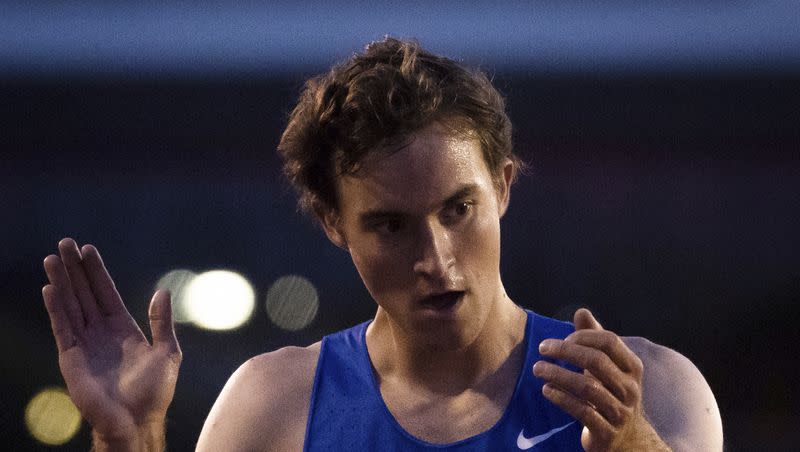BYU’s Kenneth Rooks wins steeplechase in NCAA championships showdown

In a showdown between the two fastest steeplechasers in the country, BYU’s Kenneth Rooks sprinted away from Montana State’s Duncan Hamilton on the final lap to claim a victory in the NCAA Outdoor Track and Field Championships Friday night in Austin, Texas.
Rooks turned the showdown into a rout with a 64-second final lap, crossing the finish line with a time of 8:26.17, six seconds ahead of his rival. Hamilton, a runner-up for the second straight year, had a time of 8:32.18.
It was the BYU men’s first individual national championship in four years.
With a big boost from the distance races, BYU finished 10th in the men’s team competition — the school’s best finish since eighth-place showings in 2019 and 2011. BYU’s 22.5 points came courtesy of Casey Clinger (third in the 10,000), Cameron Bates (eighth in the javelin), Ben Barton (eighth in the decathlon), Caleb Witsken (tied for sixth in the pole vault), Rooks (first in the steeplechase) and Dallin Shurts (seventh in the discus).
“I’m really pleased with the team,” said BYU coach Ed Eyestone. “Almost everyone who came to the meet scored points. Any time you finish in the top 10 you’ve got to feel good about it.”
It is not official yet, but BYU is vying with Arkansas to be named Program of the Year — an official recognition awarded to the team that has the best combined score from Cross country and indoor and outdoor track.
In 1985, Eyestone himself won national championships on the track in the 5,000- and 10,000-meter races — which were also held in in Austin, Texas — and since then the BYU men’s team has produced only 11 individual champions. The last one had been claimed by Clayton Young in 2019 in the 10,000 (also in Austin), which ended a 10-year drought. Three of the last five individual championships have come in the steeplechase.
The stage was set for the Rooks-Hamilton clash when both produced nation-leading marks in the weeks leading up to the race. Rooks made headlines one month ago when he recorded a time of 8:17.62, the second fastest ever by a collegian and the fastest time in the world at the time. He also broke a 46-year-old school record held by four-time Olympian Henry Marsh. Then a couple of weeks ago, Hamilton one-upped him. He ran 8:16.23 to surpass Rooks.
A few hours before Rooks and Hamilton met in the NCAA finals, Eyestone said, “Hamilton will either crank from the start or do a long hammer for home. ... I think Kenneth is prepared for either scenario.”
Hamilton chose the second scenario. He and Rooks bided their time through the first three laps, which were tactical and slow. Hamilton took the lead with one mile (four laps) to go and increased the pace, trying to shake the field with a long, sustained drive home.
“Kenneth responded,” says Eyestone. “He moved up from the middle of the pack and covered Duncan’s move, and I thought, ‘OK, this is going to work out.’”
Hamilton continued to push the pace and looked strong, but at the penultimate water jump, with 500 meters to go, Rooks took the jump more smoothly and efficiently than his rival and found himself in the lead. “I was a little concerned that he took the lead from so far out; I was concerned Duncan might come back on him,” says Eyestone. So was Rooks, who would later say, “The thought went through my mind that Duncan didn’t take the water jump in stride and that maybe he was getting tired. I made a move but it was a little risky. But I was committed once I made that move.”
Rooks ratcheted up the pace with 400 meters to go, and Hamilton gave chase down the backstretch. “The whole time I was ahead of him I was very aware that he was responding,” says Rooks. “I was going hard. I kept thinking, I hope I didn’t go too soon.” Rooks gained a little ground on the penultimate barrier and again over the water jump and then began a sprint for the finish line that opened up a big lead.
“On the last water jump, I took a peek back and saw that I had gapped (Hamilton),” says Rooks. “I thought, all right, I’ve just got to get over the last hurdle, and when I did I thought, OK, I’m going to win this thing.”
A year ago, Rooks had finished sixth in the same race, four places behind Hamilton.
“I respect Duncan Hamilton,” Rooks said. “He’s really good. Thankfully today was my day.”
In four weeks Rooks (and probably Hamilton) will compete in the USA outdoor national championships in Eugene, Ore., vying for a top three spot that would secure a place on the U.S. national team, which will compete in the world championships late this summer.
Related
BYU’s Casey Clinger medals at NCAA track and field championships
Claire Seymour’s BYU journey required patience but could end with an NCAA title
Meanwhile, Shurts claimed the only other points for BYU on the final day of competition, placing seventh in the discus with a throw of 201 feet.
Clinger, a junior from American Fork, competed in the 5,000-meter final, just 48 hours after his third-place performance in the 10,000, as did several of his rivals. Clinger finished 11th with a time of 14:12.54.
In other local news, Astley Davis, a junior at Southern Utah, placed eighth in the triple jump with a leap of 53 feet, 3⁄4 inches.
The women will take the stage Saturday for the final day of competition. Utah Valley’s Everlyn Kemboi and Utah’s Emily Venters will compete in the 5,000-meter final after finishing 1-2 in the 10,000-meter final Thursday night. BYU’s Claire Seymour and Meghan Hunter will compete in the 800-meter final. They had the fourth- and fifth-fastest times in the semifinals. Teammate Lexy Hamilton also will compete in the steeplechase final.

